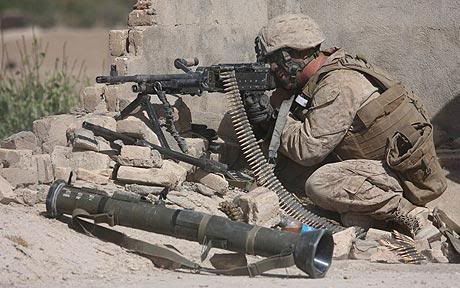The challenges facing coalition forces in
"The good news that Americans should feel at least good about in
While the White House insists that ‘Afghanistan is not in imminent danger of falling’, it also cannot say for certain that Coalition forces are in imminent proximity to winning the war on terror and human insecurity in the tiny landlocked nation. The longer the administration waits in their deliberative process, to come to a realization of coherent overarching international strategy and to draft a plan for its implementation, the more damage that can be done to their capacity for success by the Taliban and other tribal militias who are wasting no time in exploiting international media attention.
A well coordinated attack in the
The attackers were supported with a hail of rocket-propelled grenade, small arms and mortar fire directed toward the American position. The defenders managed to kill an estimated 40 of the insurgents and the rest withdrew, taking prisoner up to 30 Afghan police, including the police chief of the Kamdesh district. The American forces holding their outpost position responded with a hail of small-arms fire in return and called in artillery strikes and close-air-support from both helicopter and fixed-wing assets.
This is the second time the American forces have incurred significant losses in a single engagement in the
Elsewhere in the nation, two American soldiers were killed when their Afghan police colleague opened fire unexpectedly. (4) The assailant fled immediately and has not yet been found by coalition forces. It is unclear as to whether he simply lost his head or was working as an agent of the Taliban. These challenges to American (and by relation Coalition) authority, which imply on the surface that little progress has been made, are timed to coincide with the upper-level policy deliberations by the Obama administration and other NATO leaders.
In his essay "The Epistemology of Strategy"(5), published in the defence studies publication SITREP, Richard Maltz, a retired US Army Officer discusses the necessity for a dramatic shift in thought about war. He states that we need to move from focusing on victory in the practical engagement to the deeper epistemological analysis of events and their effects on national and international polities.
"We are moving increasingly away from predominantly mechanistic, kinetic and pyrotechnic solutions to those that require us to take account of the complexities of the environment, its inhabitants, our adversaries and most important, ourselves."(6)
The current strategy for the Afghan war actually sees the
That the Taliban have stepped up their own operations is a doubtful coincidence given the weight and tone of international discussions surrounding the fate of the nation. Despite their demonstrated ability to inflict casualties in decisive and well-organized 'raids' on military targets, the Taliban have not demonstrated any coherent ability to 'win battles'. Currently this 'resistance by body count', reminiscent certainly of American experiences in
"The war was fought on many fronts. At that time the most important one was American public opinion. Military power is not the decisive factor in war. Human beings! Human beings are the decisive factor."
--General Vo Nguyen Giap
Former NVA CINC, on the Tet Offensive(8)
Reports of rising casualties will have an effect, quite possibly a detrimental one on the ability of ISAF Leadership Personnel to prosecute the war and fulfill their mandate. Senior US General Stanley McChrystal formally requested an increase of troop levels in the nation by
Maltz's paper on the theory of knowledge and its application in the field of Strategy and Policy, identifies the need to operate within what he terms the 'Cognitive Domain'. Specifically, this is the incorporation of Psychological and Sociological factors into the determination of strategy.
"These exist on multiple levels at the same time, extending from the individual (the Psychological), through various layers of group identity, consciousness and affiliation, from the family thru the highest level of overarching identity -nationality, ethnicity, religion (the Sociological.)"(10)
The challenge now for the policy makers is how to deal with what will most certainly be a whelming tide of public opinion against the war, in light of the incident in
A decidedly ‘spun’ broadcast from the less-than-objective ‘Russian Television’ News Service discussing upcoming Anti-War protests scheduled for October 7, 2009 across the
Sources:
1. Reuters – “Taliban Return to Power Unlikely”
2. New York Times – “Eight U.S. Soldiers Dead in Bold Attack in
3. CBC – “8 U.S. Soldiers, 7 Afghans Killed in Attack”
4.Cleveland.co – “Afghan wearing police uniform kills 2
5. Maltz, Richard “The Epistemology of Strategy”. (2009, April 17). SITREP, Vol. 69, Number 3, p 7-12. (also at RCMI Archive)
6. Richard Maltz, A. “The Epistemology of Strategy”. (2009, April 17). SITREP, Vol. 69, Number 3, p.7
7. Telegraph.co.uk –“Eight US Soldiers Killed as Taliban Storm Outpost”
8. Maltz, Richard “The Epistemology of Strategy”. (2009, April 17). SITREP, Vol. 69, Number 3, p.9
9. New York Times – “Letter from Washington – A Voice Worth Heeding on
10. Maltz, Richard “The Epistemology of Strategy”. (2009, April 17). SITREP, Vol. 69, Number 3, p.10
Further Recommended Viewing:
http://news.bbc.co.uk/1/hi/world/8284173.stm
.jpg)

No comments:
Post a Comment